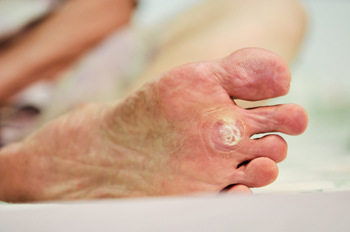
A wart is a growth on the skin that is caused by contact with a virus, namely the human papilloma virus, or HPV. Warts can grow anywhere on the body, but when they are on the feet, they are known as plantar warts. They look a bit like a callus that is growing on the bottom of the foot. Although plantar warts are not generally painful, they can be irritated by pressure on the ball of the foot. Since warts are contagious, it is a good idea not to touch them with bare hands, because the virus easily can spread to another body part. Plantar warts appear as patches of skin with dark spots. When they form as a cluster, they are known as mosaic warts. A plantar wart will likely go away on its own, but that may take some time, even as long as a year. If non-prescription medication is not effective after a few months, or if the wart looks to be infected, it is a good idea to seek medical help. A podiatrist can examine the area and remove the wart by freezing it, applying medication, or in some cases performing surgery.
Plantar warts can be very uncomfortable. If you need your feet checked, contact Gary Cockrell, DPM from Tennessee. Our doctor will assist you with all of your foot and ankle needs.
About Plantar Warts
Plantar warts are the result of HPV, or human papillomavirus, getting into open wounds on the feet. They are mostly found on the heels or balls of the feet.
While plantar warts are generally harmless, those experiencing excessive pain or those suffering from diabetes or a compromised immune system require immediate medical care. Plantar warts are easily diagnosed, usually through scraping off a bit of rough skin or by getting a biopsy.
Symptoms
- Lesions on the bottom of your feet, usually rough and grainy
- Hard or thick callused spots
- Wart seeds, which are small clotted blood vessels that look like little black spots
- Pain, discomfort, or tenderness of your feet when walking or standing
Treatment
- Freezing
- Electric tool removal
- Laser Treatment
- Topical Creams (prescription only)
- Over-the-counter medications
To help prevent developing plantar warts, avoid walking barefoot over abrasive surfaces that can cause cuts or wounds for HPV to get into. Avoiding direct contact with other warts, as well as not picking or rubbing existing warts, can help prevent the further spread of plantar warts. However, if you think you have developed plantar warts, speak to your podiatrist. He or she can diagnose the warts on your feet and recommend the appropriate treatment options.
If you have any questions please feel free to contact our offices located in Brentwood and Madison, TN . We offer the newest diagnostic and treatment technologies for all your foot and ankle needs.
